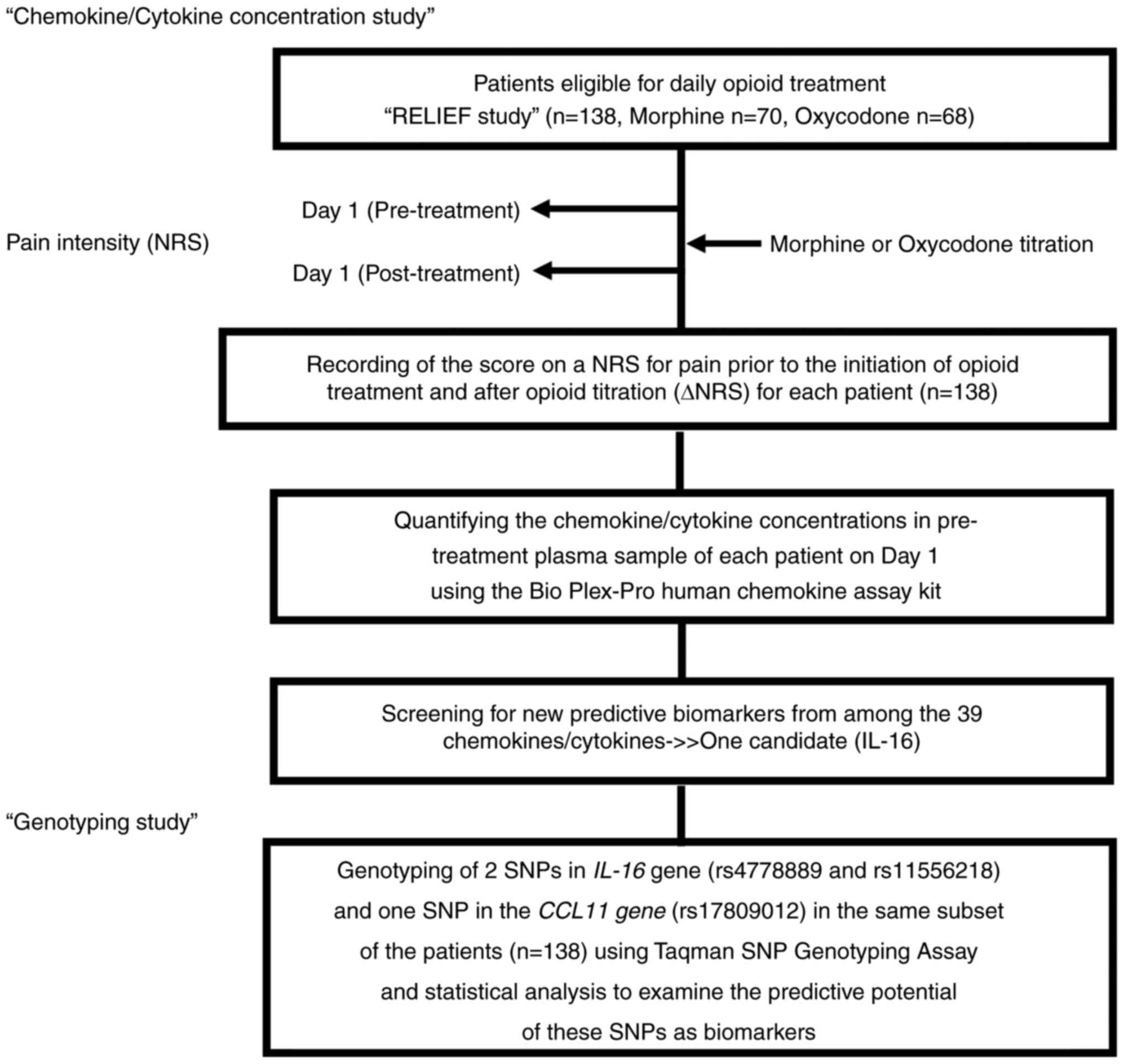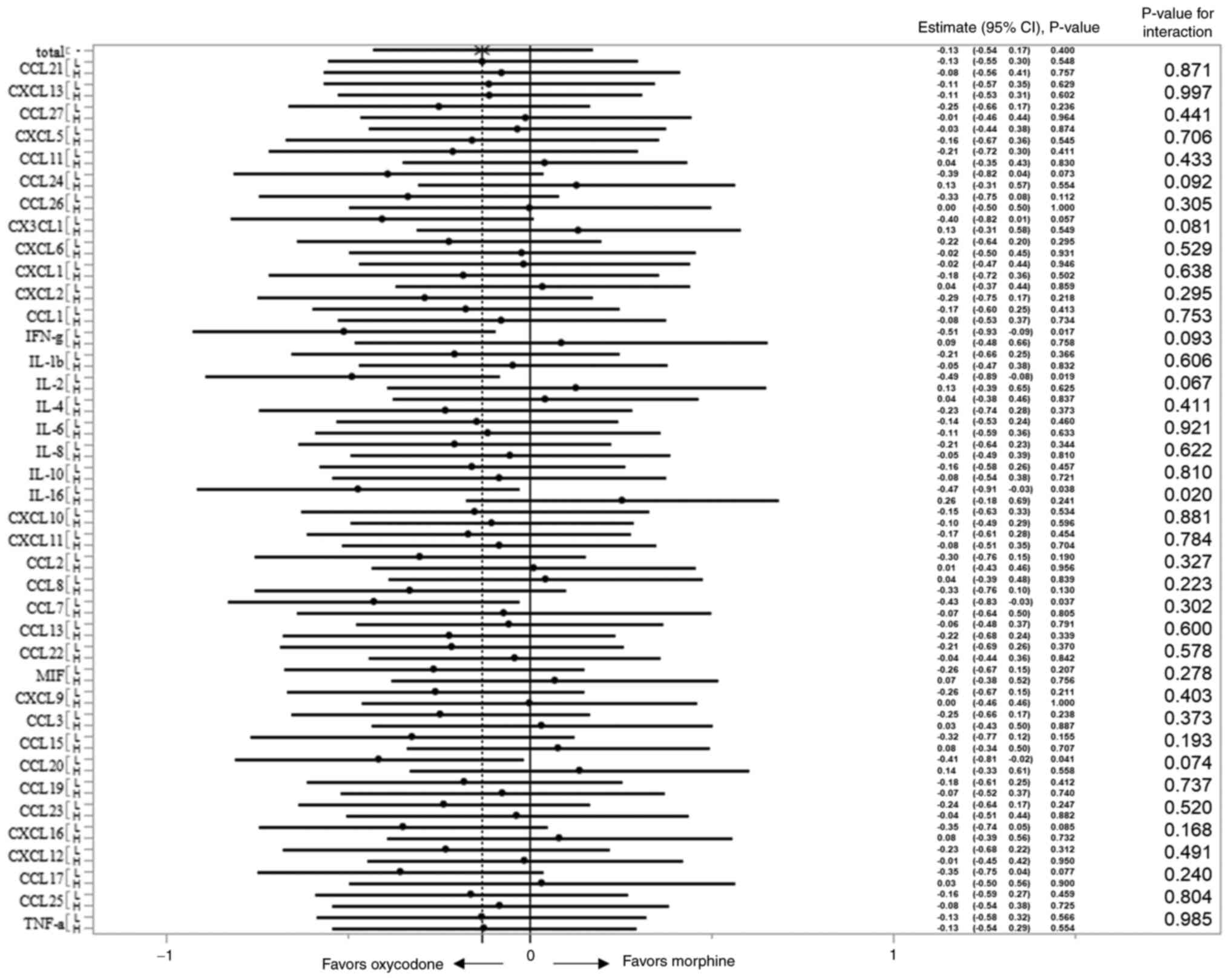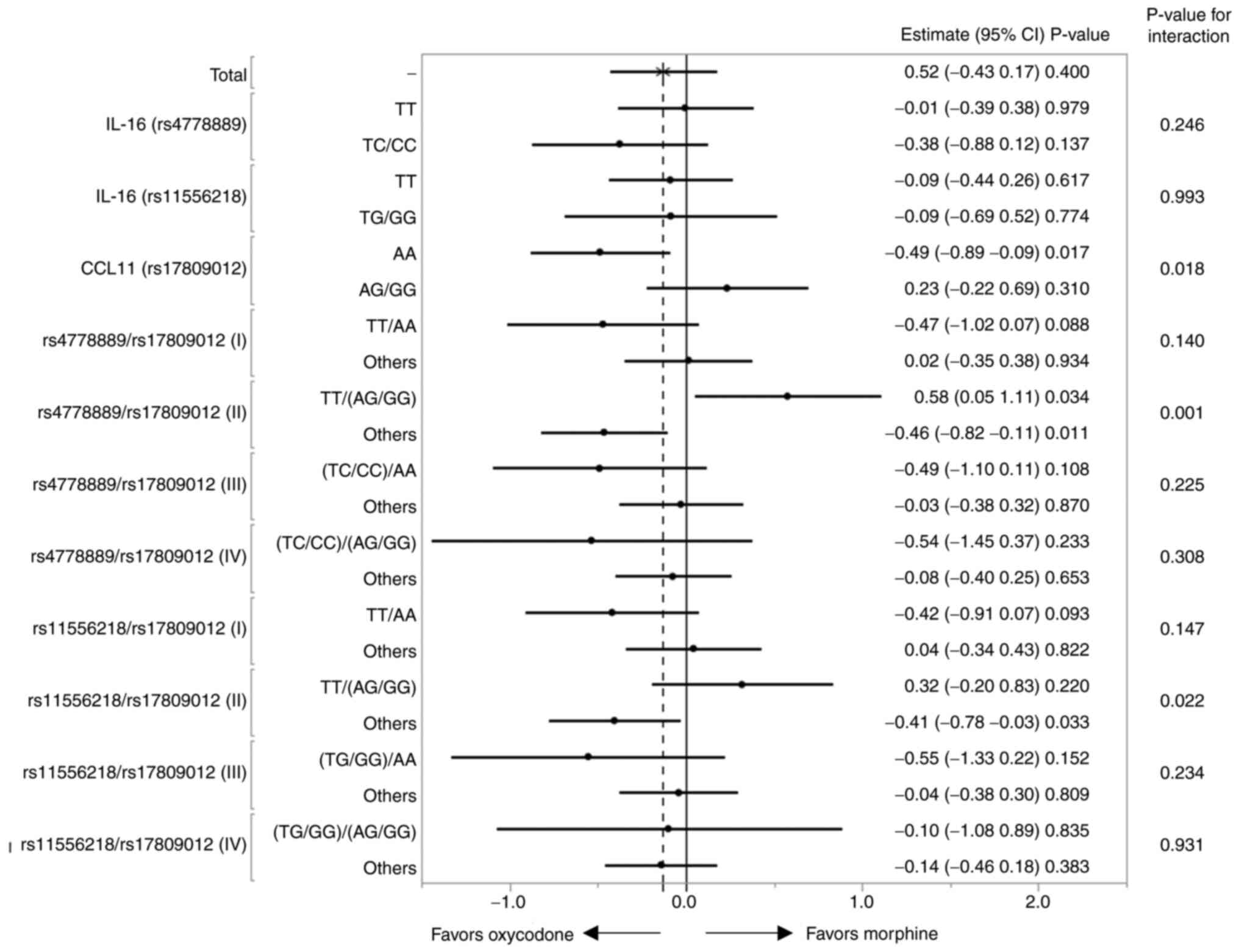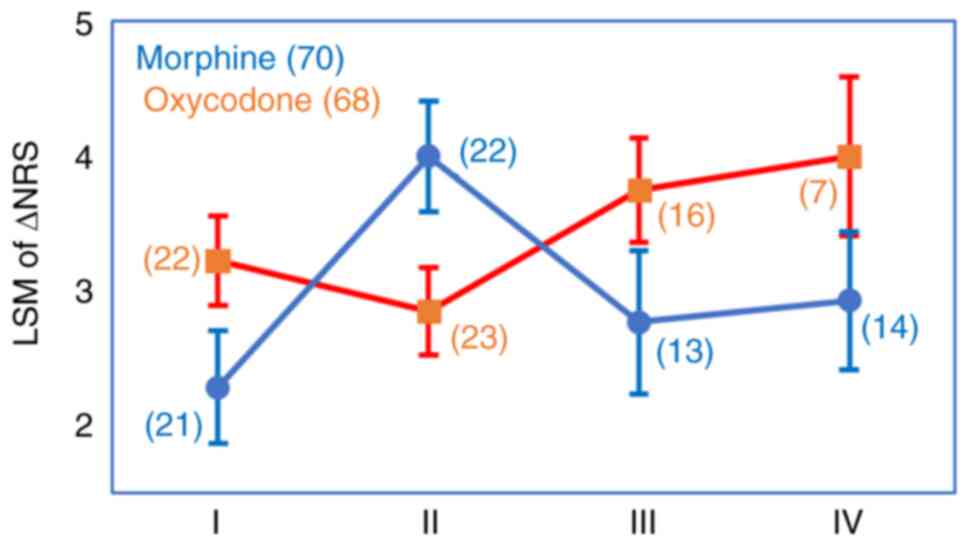|
1
|
Owusu Obeng A, Hamadeh I and Smith M:
Review of opioid pharmacogenetics and considerations for pain
management. Pharmacotherapy. 37:1105–1121. 2017.PubMed/NCBI View Article : Google Scholar
|
|
2
|
Crews KR, Monte AA, Huddart R, Caudle KE,
Kharasch ED, Gaedigk A, Dunnenberger HM, Leeder JS, Callaghan JT,
Samer CF, et al: Clinical pharmacogenetics implementation
consortium guideline for CYP2D6, OPRM1, and COMT genotypes and
select opioid therapy. Clin Pharmacol Ther. 110:888–896.
2021.PubMed/NCBI View
Article : Google Scholar
|
|
3
|
Vieira CMP, Fragoso RM, Pereira D and
Medeiros R: Pain polymorphisms and opioids: An evidence-based
review. Mol Med Rep. 19:1423–1434. 2019.PubMed/NCBI View Article : Google Scholar
|
|
4
|
Takemura M, Niki K, Okamoto Y, Kawamura T,
Kohno M, Matsuda Y and Ikeda K: Comparison of the effects of OPRM1
A118G polymorphism using different opioids: A prospective study. J
Pain Symptom Manage. 67:39–49.e5. 2024.PubMed/NCBI View Article : Google Scholar
|
|
5
|
Caraceni A, Hanks G, Kaasa S, Bennett MI,
Brunelli C, Cherny N, Dale O, De Conno F, Fallon M, Hanna M, et al:
Use of opioid analgesics in the treatment of cancer pain:
Evidence-based recommendations from the EAPC. Lancet Oncol.
13:e58–e68. 2012.PubMed/NCBI View Article : Google Scholar
|
|
6
|
Fujita Y, Matsuoka H, Chiba Y, Tsurutani
J, Yoshida T, Sakai K, Nakura M, Sakamoto R, Makimura C, Ohtake Y,
et al: Novel single nucleotide polymorphism biomarkers to predict
opioid effects for cancer pain. Oncol Lett. 26(355)2023.PubMed/NCBI View Article : Google Scholar
|
|
7
|
Matsuoka H, Tsurutani J, Chiba Y, Fujita
Y, Terashima M, Yoshida T, Sakai K, Otake Y, Koyama A, Nishio K and
Nakagawa K: Selection of opioids for cancer-related pain using a
biomarker: A randomized, multi-institutional, open-label trial
(RELIEF study). BMC Cancer. 17(674)2017.PubMed/NCBI View Article : Google Scholar
|
|
8
|
Matsuoka H, Tsurutani J, Chiba Y, Fujita
Y, Sakai K, Yoshida T, Nakura M, Sakamoto R, Makimura C, Ohtake Y,
et al: Morphine versus oxycodone for cancer pain using a
catechol-O-methyltransferase genotype biomarker: A multicenter,
randomized, open-label, phase III clinical trial (RELIEF study).
Oncologist. 28:278–e166. 2023.PubMed/NCBI View Article : Google Scholar
|
|
9
|
Ji RR, Berta T and Nedergaard M: Glia and
pain: Is chronic pain a gliopathy? Pain. 154 (Suppl 1):S10–S28.
2013.PubMed/NCBI View Article : Google Scholar
|
|
10
|
Ramesh G, MacLean AG and Philipp MT:
Cytokines and chemokines at the crossroads of neuroinflammation,
neurodegeneration, and neuropathic pain. Mediators Inflamm.
2013(480739)2013.PubMed/NCBI View Article : Google Scholar
|
|
11
|
Swarm R, Abernethy AP, Anghelescu DL,
Benedetti C, Blinderman CD, Boston B, Cleeland C, Coyle N,
Deleon-Casasola OA, Eilers JG, et al: Adult cancer pain. J Natl
Compr Canc Netw. 8:1046–1086. 2010.PubMed/NCBI View Article : Google Scholar
|
|
12
|
Swarm RA and Dans M: NCCN frameworks for
resource stratification of NCCN guidelines: Adult cancer pain and
palliative care. J Natl Compr Canc Netw. 16:628–631.
2018.PubMed/NCBI View Article : Google Scholar
|
|
13
|
Matsuoka H, Makimura C, Koyama A, Fujita
Y, Tsurutani J, Sakai K, Sakamoto R, Nishio K and Nakagawa K:
Prospective replication study implicates the
catechol-O-methyltransferase Val158Met polymorphism as a
biomarker for the response to morphine in patients with cancer.
Biomed Rep. 7:380–384. 2017.PubMed/NCBI View Article : Google Scholar
|
|
14
|
Matsuoka H, Yoshiuchi K, Koyama A,
Makimura C, Fujita Y, Tsurutani J, Sakai K, Sakamoto R, Nishio K
and Nakagawa K: Expectation of a decrease in pain affects the
prognosis of pain in cancer patients: A prospective cohort study of
response to morphine. Int J Behav Med. 24:535–541. 2017.PubMed/NCBI View Article : Google Scholar
|
|
15
|
De Souza VH, De Alencar JB, Tiyo BT, Alves
HV, Vendramini ECL, Sell AM and Visentainer JEL: Association of
functional IL16 polymorphisms with cancer and cardiovascular
disease: A meta-analysis. Oncotarget. 11:3405–3417. 2020.PubMed/NCBI View Article : Google Scholar
|
|
16
|
Gao LB, Rao L, Wang YY, Liang WB, Li C,
Xue H, Zhou B, Sun H, Li Y, Lv ML, et al: The association of
interleukin-16 polymorphisms with IL-16 serum levels and risk of
colorectal and gastric cancer. Carcinogenesis. 30:295–299.
2009.PubMed/NCBI View Article : Google Scholar
|
|
17
|
Tang YJ, Wang JL, Xie KG and Lan CG:
Association of interleukin 16 gene polymorphisms and plasma IL16
level with osteosarcoma risk. Sci Rep. 6(34607)2016.PubMed/NCBI View Article : Google Scholar
|
|
18
|
Zhu J, Qin C, Yan F, Wang M, Ding Q, Zhang
Z and Yin C: IL-16 polymorphism and risk of renal carcinoma:
Association in a Chinese population. Int J Urol. 17:700–707.
2010.PubMed/NCBI View Article : Google Scholar
|
|
19
|
Liu Z, Ma L, Qiu S and Jia T: Genetic
polymorphisms of interleukin-16 are associated with susceptibility
to primary knee osteoarthritis. Int J Clin Exp Med. 8:1401–1405.
2015.PubMed/NCBI
|
|
20
|
Burkart KM, Barton SJ, Holloway JW, Yang
IA, Cakebread JA, Cruikshank W, Little F, Jin X, Farrer LA, Clough
JB, et al: Association of asthma with a functional promoter
polymorphism in the IL16 gene. J Allergy Clin Immunol. 117:86–91.
2006.PubMed/NCBI View Article : Google Scholar
|
|
21
|
Nakayama EE, Wasi C, Ajisawa A, Iwamoto A
and Shioda T: A new polymorphism in the promoter region of the
human interleukin-16 (IL-16) gene. Genes Immun. 1:293–294.
2000.PubMed/NCBI View Article : Google Scholar
|
|
22
|
Elvert G, Kappel A, Heidenreich R,
Englmeier U, Lanz S, Acke T, Rauter M, Plate K, Sieweke M, Breier G
and Flamme I: Cooperative interaction of hypoxia-inducible
factor-2alpha (HIF-2alpha) and Ets-1 in the transcriptional
activation of vascular endothelial growth factor receptor-2
(Flk-1). J Biol Chem. 278:7520–7530. 2003.PubMed/NCBI View Article : Google Scholar
|
|
23
|
Kappel A, Schlaeger TM, Flamme I, Orkin
SH, Risau W and Breier G: Role of SCL/Tal-1, GATA, and ets
transcription factor binding sites for the regulation of flk-1
expression during murine vascular development. Blood. 96:3078–3085.
2000.PubMed/NCBI
|
|
24
|
Glas J, Török HP, Unterhuber H, Radlmayr M
and Folwaczny C: The-295T-to-C promoter polymorphism of the IL-16
gene is associated with Crohn's disease. Clin Immunol. 106:197–200.
2003.PubMed/NCBI View Article : Google Scholar
|
|
25
|
Gu XJ, Cui B, Zhao ZF, Chen HY, Li XY,
Wang S, Ning G and Zhao YJ: Association of the interleukin (IL)-16
gene polymorphisms with Graves' disease. Clin Immunol. 127:298–302.
2008.PubMed/NCBI View Article : Google Scholar
|
|
26
|
Matalliotakis M, Zervou MI, Eliopoulos E,
Matalliotaki C, Rahmioglu N, Kalogiannidis I, Zondervan K,
Spandidos DA, Matalliotakis I and Goulielmos GN: The role of IL-16
gene polymorphisms in endometriosis. Int J Mol Med. 41:1469–1476.
2018.PubMed/NCBI View Article : Google Scholar
|
|
27
|
Pawlik K, Ciechanowska A, Ciapała K,
Rojewska E, Makuch W and Mika J: Blockade of CC chemokine receptor
type 3 diminishes pain and enhances opioid analgesic potency in a
model of neuropathic pain. Front Immunol. 12(781310)2021.PubMed/NCBI View Article : Google Scholar
|


















